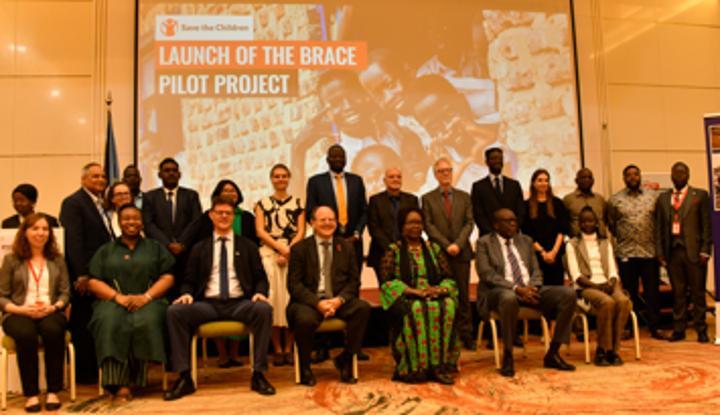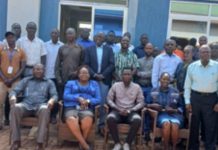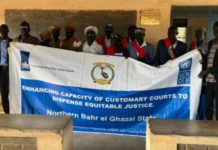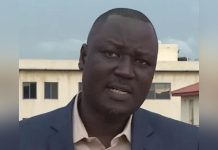Africa-Press – South-Sudan. Save the Children on Thursday said a new climate resilience programme in South Sudan will support more than 200,000 school children, as the country battles repeated floods, droughts, and heatwaves.
According to a press statement extended to Radio Tamazuj, Save the Children, with funding from the Green Climate Fund (GCF) and the Global Partnership for Education (GPE), has launched a US$17 million project to strengthen climate resilience through education across South Sudan.
“The Building the Climate Resilience of Children and Communities through the Education Sector (BRACE) pilot will support the Ministry of General Education and Instruction to reform education policies, rebuild schools, and train young people to safeguard learning as climate disasters across the country intensify,” the statement reads in part. “More than 200,000 children, half of them girls, are expected to benefit directly.”
South Sudan is one of the most vulnerable countries to climate change and natural hazards, the statement added. These climate extremes–which are becoming more frequent and severe due to the climate crisis–are disrupting learning, destroying school infrastructure, and displacing thousands of children every year.
Currently, more than 1 million people across six states in Sudan are affected by flooding, including nearly 355,000 people who have been displaced, with Jonglei and Unity states accounting for nearly 90 percent of those impacted.
Besides flooding, back-to-back heatwaves have forced schools to close for weeks at a time in the past two years, putting learning out of reach for many children.
The new programme will help thousands of children remain in school by adapting school infrastructure to a changing climate, with improvements such as better ventilation, installing solar panels, water harvesting, and installing water and sanitation systems.
Josephine Lagu, Vice President for Service Cluster, said the BRACE project is a promise to the children of South Sudan.
“As we launch this project, we are reviewing our education curricula and practice; we should put children at the center, and the process should be inclusive,” she stated. “As our schools get affected, as our people, communities are displaced, and our young girls suffer the most. Let us be reminded that they need our protection from the government and parents.”
For his part, Dr. Kuyok Abol Kuyok, the Minister of General Education and Instruction, said the launch of the project indicates that the visionary partners believe in the government’s potential.
“To the Global Climate Fund (GCF), Global Partnership for Education (GPE), and all our back donors, we extend our deepest gratitude. Your co-funding is more than financial support; it is an investment in stability, opportunity, and in breaking the cycle of climate-induced vulnerability,” he stated. “The Ministry reaffirms its commitment to ensure that every child, no matter the climate challenges they face, enjoys access to quality education.”
Meanwhile, Agot Alier, Deputy Speaker of the Child Council, said every child should be allowed to rise through resilience.
“Let this BRACE project not just build assets in our land, but also make confidence in our hearts because one day, it will be the children standing here, launching the next project, telling new stories of hope, success, and peace,” Alier said. “We are not too young to have developmental ideas, we are not too small to build something great for South Sudan.”
On his part, Save the Children Country Director Chris Nyamandi said recurrent floods, droughts, and extreme heat are leaving communities with little time to recover between crises, displacing families, and crippling vital services, including education.
“The climate crisis is threatening every child’s right to a quality, safe education. Education is not only about learning, but also survival,” he said. “Through this project, we are helping children learn, adapt, and lead in a changing climate.”
A representative of the Green Climate Fund/ GPE said the impacts of climate change are felt by many in South Sudan – floods, droughts, heatwaves, and displacement.
“They disrupt schooling, damage infrastructure, and threaten the future of an entire generation of learners,” the representative stated. “Every time a school is damaged by floods, or closed due to prolonged heatwaves, each time a teacher or a student cannot reach their classroom because the road was flooded, children’s right to learn is jeopardized.”
“To make this vision a reality, let’s also face the realities. The success of BRACE depends not only on international financing –what’s much more important is national leadership and domestic investment,” the representative added.
The UNESCO representative said they are working in partnership with Save the Children and the UNESCO International Institute for Educational Planning to lay the foundations for climate-resilient education through the Climate Smart Education System Initiative (CESI).
“Building on this progress, UNESCO will continue its support under the BRACE programme in South Sudan to strengthen policy, planning, and curricula that prepare learners for climate challenges,” the representative said. “Every child has a right to learn, no matter the crisis, no matter the climate.”
Every year, climate events disrupt learning for about 40 million children worldwide, a figure likely to rise as the intensity and frequency of weather events increase. Altogether, climate change is likely to displace more than 143 million people by 2050, disrupting the education and psychological well-being of millions of children.
For More News And Analysis About South-Sudan Follow Africa-Press






